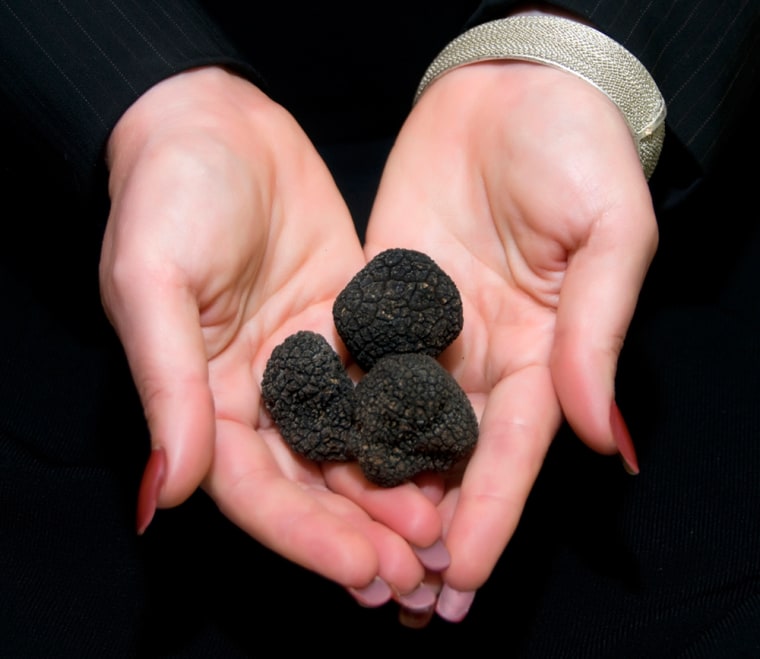In rural North Carolina, Susan Rice is planning her attack on the French.
Her strategy does not involve guns or soldiers. Instead, the assault is gastronomical, as she starts a 200-acre black truffle "farm" in hopes of earning beaucoup d'argent from the sale of the musky, earthy, aromatic fungi.
Truffles, which grow underground among the roots of trees, are prized by chefs and gourmands, but difficult to cultivate. A pound of fresh French Perigord truffles can cost more than $1,500 retail, depending on the season. White truffles from the Alba region of Italy are even more expensive.
"We're trying to make it more of an American product, where we can enjoy it here," said Rice, whose farm is near Vass, N.C., about 50 miles southwest of Raleigh.
For centuries, France, Italy and Spain have dominated the truffle market. That's in part because the spherical tubers only grow in moist soil in temperate climates and under specific trees, mainly hazelnut and oak. They don't always grow in the same place and are hard to find, even for dogs and pigs trained to sniff them out.
Alan Bergman, a chef and instructor at Johnson & Wales University in North Miami, recalls foraging for truffles in Europe. He said people who have trees that produce truffles were known to blindfold visitors to keep locations secret. Others tell stories about poachers, slayings of dogs by rivals, and car-trunk deals where brown paper bags and wads of cash change hands in a thriving black market.
Bergman, who worked as a chef in London for several years, would lock his truffles in a drawer.

"Sometimes I would take them out just to look at them, then put them back," he said.
In America, the truffle has only recently wafted into popular food consciousness, which has become much more global with the popularity of cable food networks and the organic and natural foods revolution. Even Cheesecake Factory, the American chain restaurant known for giant portions, has offered white truffle oil as a topper to its pasta Bolognese, at a $3 premium.
To help educate the American palate, Rice has enlisted the help of celebrity Italian chef Nick Stellino, who has had television cooking shows and written several cookbooks.
Stellino, who sits on Rice's advisory board, is confident at the success of the venture, comparing it to the wine revolution in California's Napa Valley, which also found itself behind France and other nations in quality and reputation when it first started.
"Teaching people how to use (truffles) for everyday cooking is the most important part," Stellino said. "We want to take away the mystery behind the truffle and make it available for everybody."
Brent Demarest, a produce buyer for Whole Foods Market, is interested in Rice's operation and, if the quality of the truffles is good, plans to sell the North Carolina truffles in its stores.
Demarest said producing truffles domestically would allow U.S. buyers to get them cheaper and fresher — the pungent flavor fades dramatically after a week or two.
No guarantees
However, he acknowledged it's not a guaranteed success.
"It's a big startup cost for her. It's kind of an unknown thing right now," Demarest said.
Rice is using money she made from her real estate and timbering ventures to fund the project. She and her investors plan to pump $25 million into the farm.
The soil where the trees will grow has been adjusted to acquire the right acidity for truffles. And the 80,000 trees she is buying will be inoculated with the tuber melanosporum, the coveted Perigord truffle, from an Eugene, Ore.-based company called New World Truffieres Inc.
No truffles are expected to grow at the farm for another few years, but Rice already is getting a dog to begin exploring later this year.
If all goes as planned, the goal is to gross about $30,000 an acre in the next five years, and $100,000 an acre by year 10.
Simple math results in a mouthwatering total: $20 million in annual sales for the 200-acre orchard in a decade.
But Rice already has competition, and it's also in North Carolina. Franklin Garland harvested his first commercial truffle crop in 1992 and sold a yearly average of 50 pounds of truffles before his orchard was exhausted in 2002. He is currently waiting for a 25-acre orchard to produce new fungi.
Garland, who estimates there are 15 to 20 small truffle-producing orchards in the U.S., said methods such as raising the lime level in the soil have improved cultivation.
"It's farming now. It's not, 'Plant trees and pray for truffles,'" Garland said.
The truffle market is expanding, experts say. Far-flung nations like Australia and China produce truffles, and the worldwide demand has sent prices up a couple hundred dollars a pound over the past few years.
But quantity, as any chef knows, has little to do with quality.
Jaime Izquierdo, a truffle distributor in North Miami Beach, said it's hard to predict if Rice will be successful. He turns his nose up at truffles grown in countries like China.
"When you're talking about quality and flavor and availability, you're comparing very different things when it comes to France and the rest of the world," Izquierdo said.
And Bergman, the chef, said it could take a while for Americans to catch on, especially in the face of French dominance in the black truffle market.
"It's ingrained in their culture," Bergman said. "I'm not sure if it will become part of our culture that quickly."